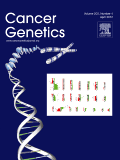
HUMAN GENETICS
metrics 2024
Driving innovation in clinical genetics.
Introduction
HUMAN GENETICS, published by SPRINGER, stands as a cornerstone journal in the field of genetics, offering a wealth of research insights since its inception in 1964. Hailing from Germany, this esteemed journal boasts an impressive Q1 ranking in both Genetics and Clinical Genetics, marking it among the top quartile of journals in these categories for 2023. With a notable Scopus rank of #7 in Clinical Genetics and a percentile ranking of 93, HUMAN GENETICS attracts significant attention from researchers and professionals dedicated to advancing our understanding of genetic influences on human health and disease. Although it does not currently offer Open Access options, the journal provides a critical platform for scholarly communication, aimed at disseminating groundbreaking findings in genetics and biotechnology. As the field evolves, HUMAN GENETICS continues to play an instrumental role in bridging the gap between laboratory research and clinical application, making it an essential resource for students and seasoned researchers alike.
Metrics 2024
 2.05
2.05 3.80
3.80 4.50
4.50 152
152Metrics History
Rank 2024
Scopus
IF (Web Of Science)
JCI (Web Of Science)
Quartile History
Similar Journals

EUROPEAN JOURNAL OF HUMAN GENETICS
Elevating Genetic Knowledge for Tomorrow's InnovationsThe EUROPEAN JOURNAL OF HUMAN GENETICS, published by SpringerNature, stands as a preeminent platform in the field of genetics and clinical genetics. Established in 1993, this prestigious journal, with an ISSN of 1018-4813 and an E-ISSN of 1476-5438, has consistently maintained its position in the Q1 quartile for both Genetics and Clinical Genetics categories as of 2023, reflecting its significant contributions to the field. Its impact is further underscored by its impressive Scopus rankings, placing it in the 92nd percentile among clinical genetics journals. The journal aims to disseminate cutting-edge research, case studies, and reviews that advance our understanding of human genetics, promoting collaboration and innovation among researchers, professionals, and students alike. While it does not currently offer open access, the journal provides substantial value through its rigorous peer review process and commitment to quality. As it continues to shape the future of genetic research through 2024 and beyond, the EUROPEAN JOURNAL OF HUMAN GENETICS remains an essential resource for those dedicated to exploring the complexities of human heredity.

HUMAN HEREDITY
Connecting Generations Through Genetic InsightsHUMAN HEREDITY is a peer-reviewed journal published by KARGER, dedicated to advancing the understanding of genetics and inherited traits in human populations. Established in 1950, this journal has become a vital resource for researchers, professionals, and students in the fields of genetics and clinical genetics, currently categorized in the third quartile (Q3) for both general and clinical genetics as of 2023. With an ISSN of 0001-5652, HUMAN HEREDITY provides rigorous academic content that analyzes heredity patterns and genetic variations, aiming to illuminate the complexities of human genetic inheritance. Although it does not operate on an open access model, the journal offers a comprehensive collection of studies and insights that are crucial for genetic research and clinical applications. Situated in Basel, Switzerland, HUMAN HEREDITY contributes to the global dialogue in genetics, making it an essential platform for those seeking to enrich their understanding of human heredity in a rapidly evolving scientific landscape.

Genetics Research
Illuminating the Path of Genetic UnderstandingGenetics Research, published by HINDAWI LTD, is a distinguished open access journal that has been at the forefront of genetic studies since its inception in 1960. With the transition to open access in 2019, this journal has expanded its accessibility, fostering knowledge dissemination across the global scientific community. Operating out of the United Kingdom, it provides a platform for innovative research in the fields of genetics and molecular biology, encompassing a broad range of topics that are highly relevant to medical sciences. As of 2023, it holds a Q4 classification in Genetics and a Q3 classification in miscellaneous Medicine, reflecting its ongoing commitment to scholarly excellence amidst shifting academic landscapes. While the journal's H-index remains unlisted, its indexed ranking within Scopus, with a rank of #325/328 in the Genetics category highlights the challenges ligated to its niche audience. Nevertheless, it serves as a crucial resource for researchers, professionals, and students eager to contribute to and stay informed on the latest genetic research trends and breakthroughs.

JOURNAL OF GENETICS
A Legacy of Excellence in Genetic ScholarshipJOURNAL OF GENETICS, published by the Indian Academy of Sciences, is a pivotal platform for researchers and scholars in the field of genetics. With its long-standing history dating back to 1910, this journal has consistently contributed to the academic discourse through the rigorous publication of original research, reviews, and case studies. Despite its current classification in the Q4 quartile for the 2023 metrics in Genetics, the journal plays a critical role in advancing our understanding of genetic principles, experimental methodologies, and innovations. Spanning a diverse array of topics, the journal aims to foster scholarly exchange and collaboration within the global genetics community. For researchers aiming to publish their work, accessing the journal’s comprehensive archives, which include publications from as early as 1910 to the present day, offers a valuable perspective on the evolution of genetic research. As it continues to adapt to the changing landscape of scientific inquiry, JOURNAL OF GENETICS remains a significant resource for students, professionals, and academics dedicated to exploring the complexities of genetics.

Cancer Genetics
Connecting Genetics to Cancer: A Pathway to ProgressCancer Genetics is an esteemed peer-reviewed journal dedicated to advancing the field of cancer research through the lens of genetics. Published by Elsevier Science Inc and available in both print (ISSN: 2210-7762) and online (E-ISSN: 2210-7770), this journal aims to provide a platform for the dissemination of high-quality studies that unravel the genetic underpinnings of cancer. Since its inception in 2011, Cancer Genetics has become a significant resource for researchers, professionals, and students with a shared interest in understanding the intricate relationship between genetics and oncogenesis. With an impact factor that reflects its influence, the journal has maintained a Q3 ranking in Cancer Research, Genetics, and Molecular Biology as of 2023, indicating its growing importance in these fields. Additionally, the journal offers open access options to ensure that crucial findings are easily accessible to the global research community. By bridging the gap between genetics and cancer studies, Cancer Genetics plays a pivotal role in fostering innovation and collaboration among scientists and clinicians striving to improve cancer diagnosis and treatment.

GENES & GENETIC SYSTEMS
Unlocking the Mysteries of Genes and Genetic SystemsGENES & GENETIC SYSTEMS, an esteemed journal published by the Genetics Society of Japan, serves as a vital platform for the dissemination of innovative research within the fields of genetics, molecular biology, and medicine. Established in 1996 and based in Mishima, Shizuoka, Japan, this journal has actively contributed to the academic community, fostering collaboration and knowledge sharing among researchers and professionals. The journal’s impact can be seen through its category quartiles, which reflect its position in Genetics, Molecular Biology, and Medicine, and while it currently ranks in Q4 in Genetics and Q3 in Medicine (miscellaneous), it is poised for growth as it continues to publish pivotal studies. With a commitment to open access, GENES & GENETIC SYSTEMS ensures that research findings are freely accessible to the global scientific community, promoting a more inclusive approach to knowledge distribution. This journal is essential for students, researchers, and professionals seeking to stay informed of advancements in genetic research and its implications for the broader field of medicine.

Human Genome Variation
Transforming Genetic Understanding, One Study at a TimeHuman Genome Variation, published by SpringerNature, is an esteemed open access journal dedicated to the field of genetic research and exploration. Since its inception in 2014, the journal has been at the forefront of advancing our understanding of human genome diversity and its implications in health and disease. With an E-ISSN of 2054-345X, it features a diverse array of studies that encompass biochemistry, genetics, and molecular biology, making it an invaluable resource for researchers and professionals alike. The journal holds a Q3 ranking in both biochemistry and genetics, and a Q4 ranking in molecular biology, highlighting its growing influence within these disciplines. As the landscape of genomics continues to evolve, Human Genome Variation serves as a platform for the dissemination of high-quality research, fostering collaboration and innovation within the scientific community. Researchers and academics are invited to contribute to this pivotal journal, which not only provides open access to its content since 2014 but also aims to bridge the gap between basic research and clinical applications in genetics.

ANNALS OF HUMAN GENETICS
Innovating Understanding in Genetics and HealthANNALS OF HUMAN GENETICS is a distinguished peer-reviewed journal extensively covering the field of genetics, published by Wiley. Established in 1954 and extending its influence into 2024, this journal features comprehensive research articles, reviews, and case studies aimed at advancing our understanding of human genetic conditions and their implications on health. With its ISSN number 0003-4800 and E-ISSN 1469-1809, the journal has carved a prominent niche within the academic community, currently ranking in the third quartile in both genetic and clinical genetics categories (Q3, 2023). Its Scopus rankings reflect its credibility, placing it #54 out of 99 in clinical genetics. Though it is not open access, it remains an essential resource for researchers and practitioners seeking to explore the latest findings and methodologies in genetics, serving as a critical platform for knowledge dissemination and dialogue within the scientific community. As we delve deeper into the complexities of our genetic makeup, the ANNALS OF HUMAN GENETICS continues to play a vital role in fostering innovation and collaboration in this ever-evolving field.

RUSSIAN JOURNAL OF GENETICS
Illuminating Pathways in Genetic ResearchRUSSIAN JOURNAL OF GENETICS is a significant platform in the field of genetics, published by PLEIADES PUBLISHING INC since its inception in 1996. With an ISSN of 1022-7954 and an E-ISSN of 1608-3369, the journal focuses on a wide array of topics within genetics, providing researchers, professionals, and students with insights into advancements and discoveries in this ever-evolving discipline. While it currently holds a Q4 ranking in the 2023 Genetics category according to Scopus, representing invaluable opportunities for knowledge dissemination, the journal is actively working to enhance its impact in future rankings. Readers will find the journal a repository of diverse genetic research findings, methodologies, and theoretical advancements. Although it is not an open-access journal, it is committed to serving the academic community through rigorous peer-reviewed articles. With a consistent publication trajectory spanning to 2024, the RUSSIAN JOURNAL OF GENETICS remains a crucial resource for those aspiring to stay at the forefront of genetic research and applications.

Human Genetics and Genomics Advances
Illuminating the Path of Human GeneticsHuman Genetics and Genomics Advances is a premier academic journal published by Elsevier, dedicated to the field of human genetics and genomic medicine. With an ISSN of 2666-2477, this journal has quickly established itself as a leading platform for disseminating cutting-edge research from its inception in 2020. Featured prominently in Q1 categories for both Clinical Genetics and Molecular Medicine as of 2023, it ranks favorably among its peers, reflected in its Scopus rankings. The journal not only offers valuable insights into the latest advancements and applications in genetics but also facilitates open dialogue among researchers, clinicians, and students. As an open access publication, it ensures that groundbreaking findings in genetics are readily accessible to a global audience, promoting knowledge sharing and collaboration. Human Genetics and Genomics Advances continues to be instrumental in moving the field forward, providing a vital resource for those at the forefront of genetic and genomic research.